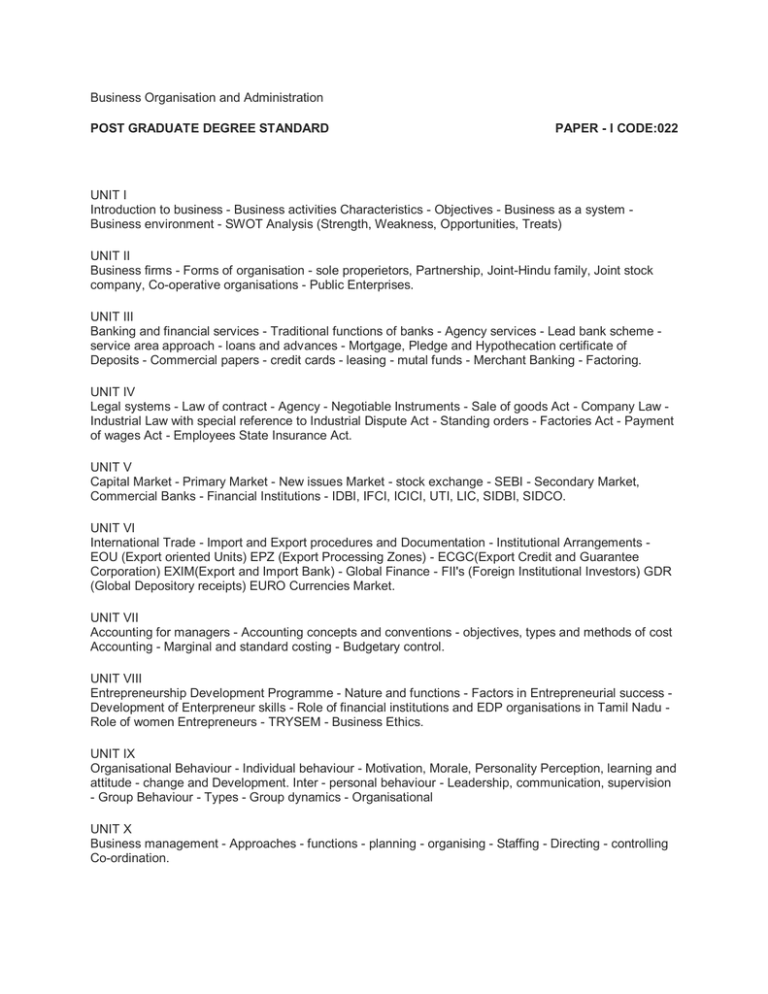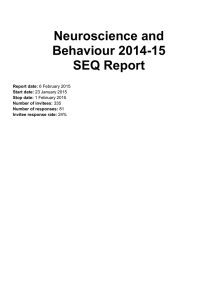Business Organisation and Administration UNIT I
advertisement

Business Organisation and Administration POST GRADUATE DEGREE STANDARD PAPER - I CODE:022 UNIT I Introduction to business - Business activities Characteristics - Objectives - Business as a system Business environment - SWOT Analysis (Strength, Weakness, Opportunities, Treats) UNIT II Business firms - Forms of organisation - sole properietors, Partnership, Joint-Hindu family, Joint stock company, Co-operative organisations - Public Enterprises. UNIT III Banking and financial services - Traditional functions of banks - Agency services - Lead bank scheme service area approach - loans and advances - Mortgage, Pledge and Hypothecation certificate of Deposits - Commercial papers - credit cards - leasing - mutal funds - Merchant Banking - Factoring. UNIT IV Legal systems - Law of contract - Agency - Negotiable Instruments - Sale of goods Act - Company Law Industrial Law with special reference to Industrial Dispute Act - Standing orders - Factories Act - Payment of wages Act - Employees State Insurance Act. UNIT V Capital Market - Primary Market - New issues Market - stock exchange - SEBI - Secondary Market, Commercial Banks - Financial Institutions - IDBI, IFCI, ICICI, UTI, LIC, SIDBI, SIDCO. UNIT VI International Trade - Import and Export procedures and Documentation - Institutional Arrangements EOU (Export oriented Units) EPZ (Export Processing Zones) - ECGC(Export Credit and Guarantee Corporation) EXIM(Export and Import Bank) - Global Finance - FII's (Foreign Institutional Investors) GDR (Global Depository receipts) EURO Currencies Market. UNIT VII Accounting for managers - Accounting concepts and conventions - objectives, types and methods of cost Accounting - Marginal and standard costing - Budgetary control. UNIT VIII Entrepreneurship Development Programme - Nature and functions - Factors in Entrepreneurial success Development of Enterpreneur skills - Role of financial institutions and EDP organisations in Tamil Nadu Role of women Entrepreneurs - TRYSEM - Business Ethics. UNIT IX Organisational Behaviour - Individual behaviour - Motivation, Morale, Personality Perception, learning and attitude - change and Development. Inter - personal behaviour - Leadership, communication, supervision - Group Behaviour - Types - Group dynamics - Organisational UNIT X Business management - Approaches - functions - planning - organising - Staffing - Directing - controlling Co-ordination. PAPER - II UNIT I Personnel Management - Meaning, scope, Objectives - Procurement - Manpower Planning - Recruitment - Selection and placement - Training and Development - wages and salary Administration - performance Appraisal - Promotion and Transfer - Industrial Relations - Industrial Disputes Settlement - collective Bargain - workers Participation in Management - Labour Welfare Measures. UNIT II FINANCIAL MANAGEMENT - Meaning, Scope, Objectives - financial planning - capitalisation - Methods of financing - cost of capital - Leverages - Analysis of Financial Statements - Fund flow statements - cash flow statements - Ratio Analysis - Capital Budgeting - Working Capital Management. UNIT III Production Management - Meaning, Scope, Objectives - Plant Location - Layout - Production Planning and control - production control techniques - quality control - Inspection - Maintenance Management and Methods analysis - concepts of CAD, CAM. UNIT IV Materials Management - Meaning scope objectives - purchasing - storing - methods of Inventory control Vendor rating and development - Materials handling equipments store room equipments. UNIT V MARKETING MANAGEMENT - Core concept of marketing - Scope of marketing - functions and Importance of Marketing - Market segmentation, consumerism - Marketing Research - Marketing Mix Product, Price, Place and Promotion - Marketing, Information System - Consumer Behaviour. UNIT VI Management Information System - meaning - scope - objectives -structure - Components of Data Processing - concepts - Information, Systems, Communication - Decision Making Process - Information support for Managerial process - Decision support system - Supporting System Vs MIS - future prespective and systems management. UNIT VII Quantitative Techniques - Measures of Central tendency - Measures of dispersion - Correlation regression, Time Series - Index numbers - Probability distribution - hypothesis testing - Matrix and set theories. UNIT VIII Operations Research - Meaning, Scope, importance - objectives - Models in operations Research Decision theory, Decision making situations - Planning Scheduling and Controling by PERT and CPM. UNIT IX Managerial Economics - concepts and Techniques - Demand ans supply analysis - forecasting techniques - Pricing decisions under different types of Market structures - concepts in resource allocation. UNIT X Emerging Trends in Management - Business Process Reengineering (BPR) - Total qualify Management (TQM) Vs Total Productivity Management(TPM) - Quality Circles - Financial Engineeering - Credit Rating and Rating Agencies - Strategic Management.


